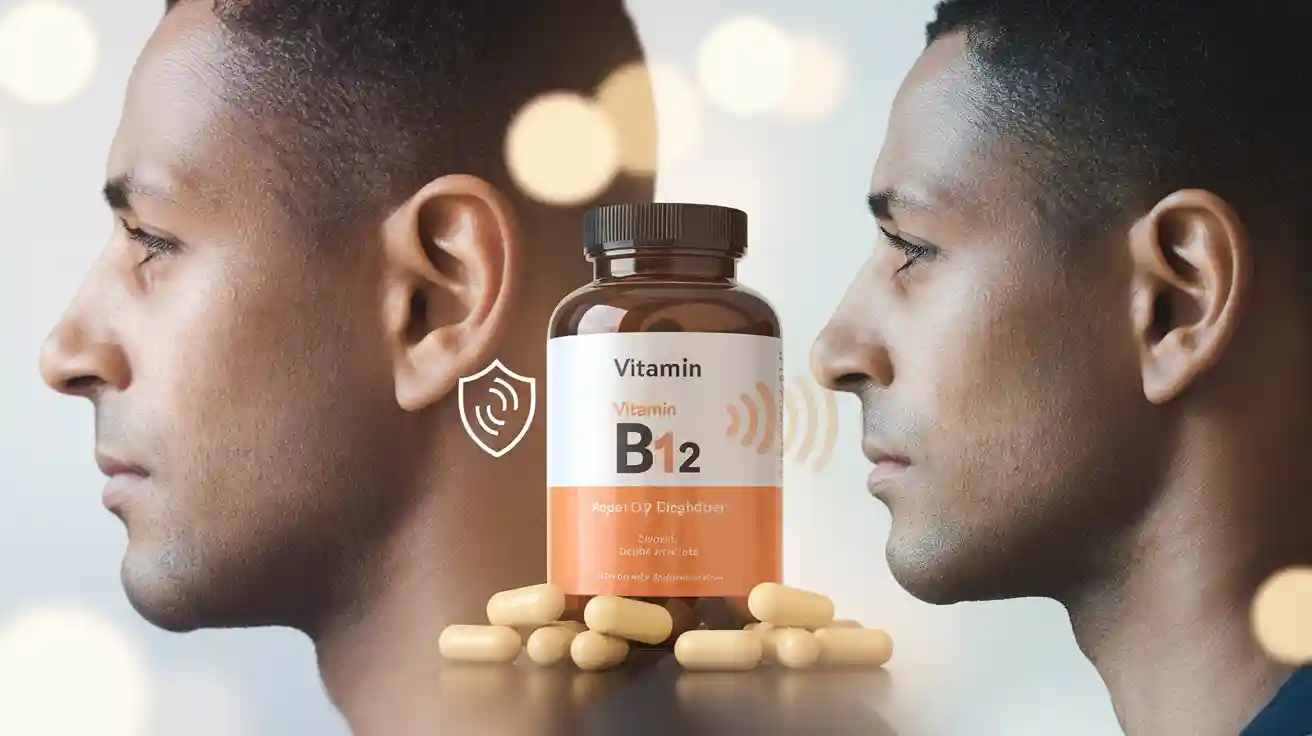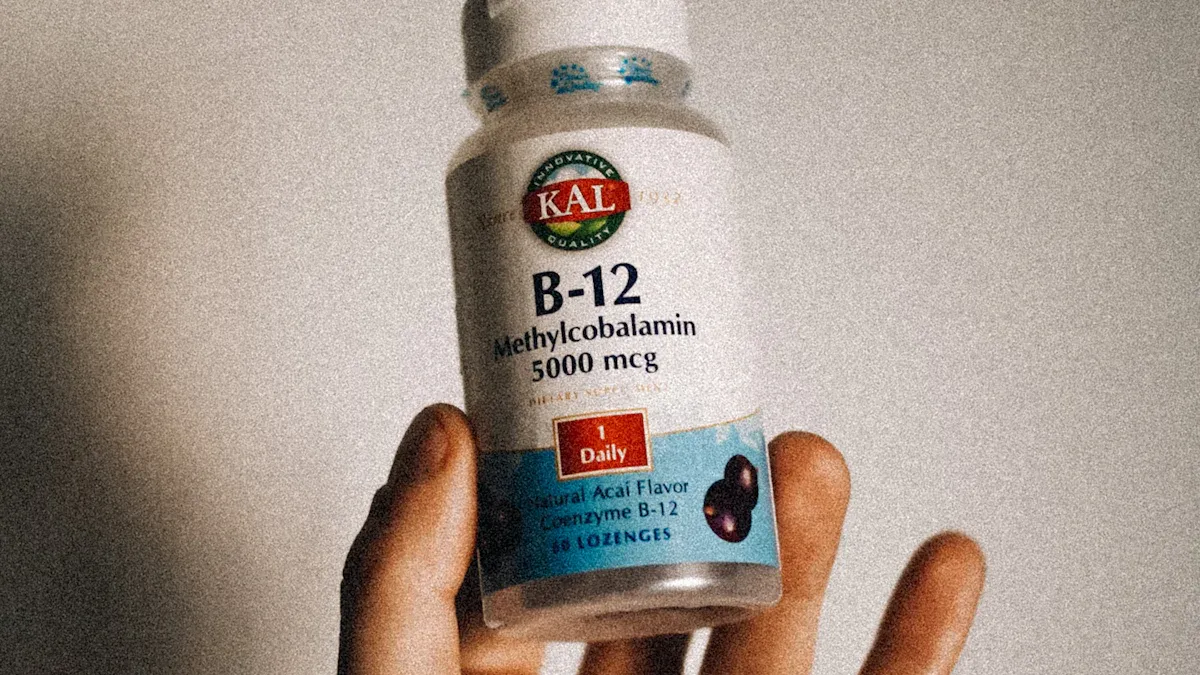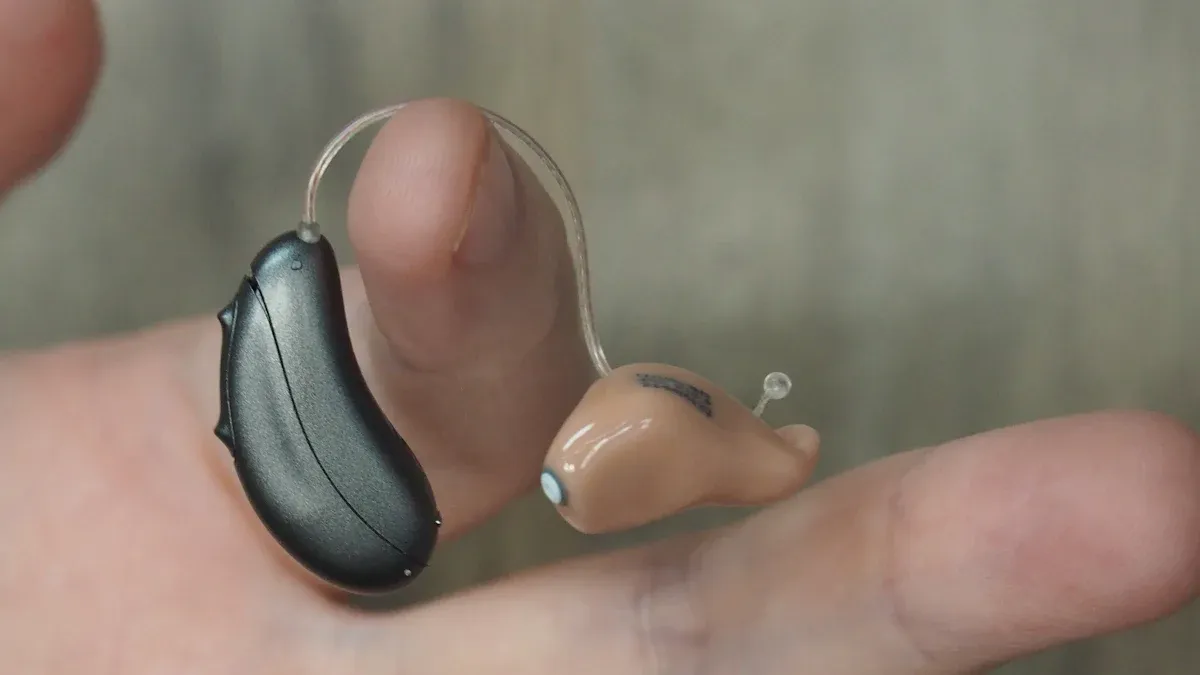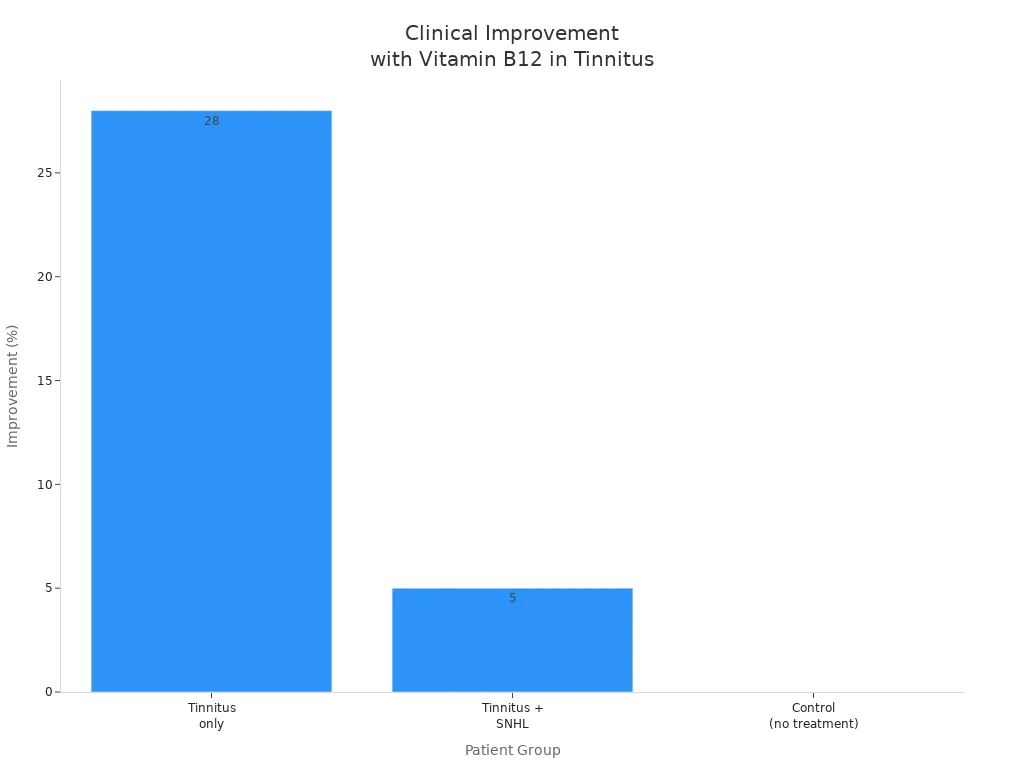Does Vitamin B12 Help Prevent Tinnitus
Table of Contents

You might wonder if taking b12 can help prevent tinnitus. Recent research shows mixed results. One clinical trial found that b12 therapy improved tinnitus symptoms in people who had a b12 deficiency. However, larger studies did not find a clear benefit for everyone. Many experts agree that understanding the connection between Tinnitus and Vitamin B12 is important, especially if you belong to a group at risk for deficiency. Tinnitus often links to low b12 levels, but not all cases respond to supplements.
Tinnitus and Vitamin B12
What Is Tinnitus
You may have heard people talk about ringing in the ear. This is one of the most common tinnitus symptoms. Tinnitus means you hear sounds that do not come from outside your body. These sounds can include buzzing, hissing, clicking, or roaring. You might notice them in one ear, both ears, or even inside your head. Tinnitus can be constant or come and go. Many people with chronic subjective tinnitus say the noise never stops. The loudness and pitch can change, and sometimes movements of your jaw or neck make it worse. Tinnitus often appears with hearing loss, and older adults have a higher risk. Studies show that about 10 to 15% of adults worldwide experience tinnitus, and the odds go up as you age. If you have hearing problems, you are more likely to develop tinnitus. Some causes of tinnitus include age-related hearing loss, exposure to loud noise, and certain medical conditions.
Tinnitus can affect your mood and concentration. You may feel anxious, have trouble sleeping, or find it hard to focus. Severe cases can lead to distress and even depression.
Vitamin B12’s Role
Vitamin B12 plays a key part in keeping your hearing health strong. Your nerves need b12 to work well, especially those in your ear and brain. B12 helps protect nerve fibers and supports clear nerve signals. If you do not get enough b12, your body may struggle to process sounds. Low b12 levels can contribute to tinnitus and sensorineural hearing loss. Older adults with hearing loss often have lower b12 levels than those with normal hearing. B12 also helps control homocysteine, an amino acid that can damage nerves and blood vessels in your ear if it gets too high. Children need b12 for healthy ear development. If you lack b12, you may notice problems with hearing, especially in noisy places. Some studies show that vitamin b12 and tinnitus are linked, and people with b12 deficiency may see improvement in tinnitus symptoms after taking supplements. The connection between tinnitus and vitamin b12 is important because nerve damage from low b12 can contribute to tinnitus.
Vitamin B12 Deficiency

Causes and Risk Groups
You can develop vitamin b12 deficiency for many reasons. Some people do not get enough b12 from food. Others cannot absorb vitamin b12 well because of medical problems. The table below shows common causes:
| Cause Category | Specific Causes / Details |
|---|---|
| Medical Causes | Pernicious anemia, celiac disease, Crohn’s disease, gastrointestinal surgeries, certain medications |
| Dietary Causes | Vegetarian and vegan diets, infants of vegan mothers |
You face a higher risk of vitamin b12 deficiency if you belong to certain groups:
- Older adults, especially those over 60 years old, often have trouble absorbing vitamin b12.
- Vegetarians and vegans have a higher chance of deficiency because plant foods do not contain b12.
- People with pernicious anemia or digestive disorders like celiac disease or Crohn’s disease may not absorb vitamin b12 well.
- Infants of vegan mothers can develop deficiency early in life.
- People who eat little or no meat, or who have had stomach surgery, also face a higher risk of deficiency.
In some countries, vitamin b12 deficiency is more common. For example, in the Middle East, up to half of adults may have low b12 levels. In the United States and United Kingdom, about 6% of people over 60 have deficiency, and the risk increases with age. Men sometimes have lower b12 levels than women.
Signs and Symptoms
Vitamin b12 deficiency can cause many symptoms. You may notice problems with your nerves and hearing health. Some common signs include:
- Numbness or tingling in your hands, fingers, or toes
- Trouble with balance or walking
- Weakness and tiredness
- Mood changes, such as feeling sad or anxious
- Memory loss or trouble thinking clearly
- Difficulty concentrating
- Sleep problems
- Muscle weakness
If you have vitamin b12 deficiency, you may also face a higher risk of hearing loss. This can make it harder to hear sounds clearly. Some people with deficiency notice tinnitus symptoms, such as ringing or buzzing in the ears. These problems can affect your hearing health and quality of life. If you have a nutritional deficiency, your body cannot work as it should. You should talk to your doctor if you notice any of these symptoms or if you belong to a high-risk group. Early treatment can help prevent hearing loss and protect your hearing.
Vitamin B12 and Tinnitus
Research and Evidence
You may wonder if scientists have found a strong link between tinnitus and vitamin b12. Many studies have explored this topic. Some researchers discovered that people with chronic subjective tinnitus often have lower levels of b12. One study showed that people who received b12 supplements noticed improvement in their tinnitus symptoms, especially if they had vitamin b12 deficiency. Other studies did not find the same results for everyone. You should know that the link between tinnitus and vitamin deficiencies is complex. Not all cases of tinnitus respond to supplements.
Researchers also looked at hearing loss and its connections with vitamin b12 deficiency. They found that people with hearing problems often have low b12 levels. Some studies suggest that b12 helps protect your hearing by keeping your nerves healthy. You may see improvement in tinnitus if you treat a deficiency. Scientists continue to study the connection between tinnitus and vitamin b12 to learn more about how it affects hearing health.
Tip: If you have tinnitus and anemia, ask your doctor to check your b12 levels. You may benefit from supplements if you have a deficiency.
How Deficiency Affects Hearing
Vitamin b12 plays a big role in your hearing. Your nerves need b12 to send clear signals from your ears to your brain. If you have vitamin b12 deficiency, your nerves may not work well. This can lead to hearing loss and tinnitus. You may notice ringing, buzzing, or other sounds in your ears. These symptoms can make it hard to focus or sleep.
Here are some ways deficiency affects your hearing:
-
Nerve Demyelination
Your nerves have a protective covering called myelin. B12 helps keep this covering strong. If you lack b12, your nerves lose myelin. This makes it harder for signals to travel. You may develop hearing loss or tinnitus. -
Impaired Cochlear Function
The cochlea is a part of your inner ear. It helps you hear sounds. B12 supports healthy cochlear cells. Deficiency can damage these cells. You may notice hearing loss or tinnitus. -
Tinnitus and Anemia
If you have anemia from low b12, your blood cannot carry enough oxygen to your ears. This can cause hearing problems. Many people with tinnitus and anemia have vitamin b12 deficiency. You may see improvement in your hearing if you treat the deficiency.
| Mechanism | How It Affects Hearing and Tinnitus |
|---|---|
| Nerve Demyelination | Slows nerve signals, causes hearing loss |
| Impaired Cochlear Cells | Damages ear cells, leads to tinnitus |
| Tinnitus and Anemia | Reduces oxygen, worsens hearing loss |
You may ask if supplements help. If you have deficiency-related tinnitus, b12 supplements can improve your symptoms. You should talk to your doctor before starting any new treatment. Not everyone with tinnitus will benefit from b12. Understanding the connection between tinnitus and vitamin b12 can help you make better choices for your hearing health.
Note: You should not rely only on supplements. Good nutrition and regular checkups help protect your hearing.
Tinnitus Relief Toolkit

Diet and Supplements
You can take control of your tinnitus relief toolkit by focusing on a healthy diet and the right dietary supplements for tinnitus. Eating a variety of foods helps your body get the nutrients it needs for hearing and overall health. Dairy products, like Greek yogurt and Swiss cheese, give you vitamin B12 that your body can use easily. Fish such as trout and salmon also provide high levels of vitamin B12. If you do not eat animal foods, try fortified breakfast cereals or soy milk. These foods help you meet your daily needs.
| Food Source | Vitamin B12 (mcg per serving) |
|---|---|
| Clams (3 oz) | 84 |
| Fortified breakfast cereal | 6 |
| Trout (3 oz) | 5.4 |
| Salmon (3 oz) | 4.9 |
| Greek yogurt (6 oz) | 1.3 |
| Swiss cheese (1 slice) | 0.9 |
Older adults may need more vitamin B12 because their bodies do not absorb it well. You can use dietary supplements for tinnitus if you have trouble getting enough from food. The recommended daily intake for adults is 2.4 micrograms, but older adults may need 100 to 400 micrograms from supplements. Strict vegetarians and women planning pregnancy should also consider dietary supplements.
A healthy diet supports your tinnitus relief toolkit. You can also try sound therapy, cognitive behavioral therapy, and tinnitus retraining therapy. These methods help you manage symptoms and improve your quality of life. Remember, no single food or supplement cures tinnitus. You need a full plan for effective management and treatment.
Tip: Keep a food diary to track your healthy diet and see if certain foods affect your tinnitus.
When to See a Doctor
You should see a doctor if you notice tinnitus with other symptoms. Watch for warning signs like numbness, pins and needles, vision changes, trouble walking, memory loss, or mood changes. If you feel tired, confused, or have trouble thinking, get medical help right away. These signs may mean you have a vitamin B12 deficiency that needs treatment.
Doctors use blood tests to check your vitamin B12 levels. If you have deficiency, your doctor may suggest dietary supplements or injections. Do not start supplements without talking to a healthcare provider. Some people with tinnitus improve after treating vitamin B12 deficiency, but not everyone does. Your doctor may also recommend sound therapy, cognitive behavioral therapy, or tinnitus retraining therapy as part of your tinnitus relief toolkit.

A healthy diet, regular checkups, and a complete tinnitus relief toolkit give you the best chance for relief. You can combine dietary supplements, sound therapy, and other treatments for better results.
You now know that vitamin B12 deficiency can increase your risk for tinnitus and hearing loss. People who eat little meat or dairy, older adults, and those with certain health conditions face higher risk. Experts recommend a balanced diet with foods like fish, dairy, and fortified cereals to support nerve health. Always talk to your doctor before starting supplements. Remember, vitamin B12 can help if you have a deficiency, but it is not a cure for all tinnitus or hearing loss. Take steps to protect your hearing and keep your body healthy.
Stay proactive—early diagnosis and healthy habits can make a difference for your ears.
FAQ
Can vitamin B12 cure tinnitus?
Vitamin B12 cannot cure tinnitus for everyone. If you have a deficiency, supplements may help reduce symptoms. You should talk to your doctor to find out if low B12 is causing your tinnitus.
How do you know if you need a vitamin B12 supplement?
You may need a supplement if you feel tired, weak, or notice numbness. Blood tests can show if your B12 levels are low. Your doctor can help you decide if you need extra B12.
What foods are best for boosting vitamin B12?
You can get vitamin B12 from clams, fish, eggs, dairy, and fortified cereals. If you do not eat animal foods, choose fortified plant-based products. Eating a variety of these foods helps you meet your daily needs.
Tip: Keep a food diary to track your B12 intake.
Is it safe to take vitamin B12 every day?
Vitamin B12 is safe for most people because your body removes extra amounts. You should follow your doctor’s advice about how much to take. High doses rarely cause side effects.

Poseidon
Master of Nutritional Epidemiology, University of Copenhagen, Herbal Functional Nutrition Researcher
Focus: The scientific application of natural active ingredients such as Tongo Ali, Horny Goat Weed, and Maca to sexual health and metabolic regulation.
Core Focus:
Men: Use a combination of Tongo Ali (an energizing factor) + Maca (an energy reserve) to improve low energy and fluctuating libido.
Women: Use a combination of Horny Goat Weed (a gentle regulator) + Maca (a nutritional synergist) to alleviate low libido and hormonal imbalances.
Stressed/Middle-Aged Adults: This triple-ingredient synergy supports metabolism, physical strength, and intimacy.
Product Concept:
Based on traditional applications and modern research (e.g., Tongo Ali promotes testosterone-enhancing enzyme activity, and icariin provides gentle regulation), we preserve core active ingredients and eschew conceptual packaging—using natural ingredients to address specific needs.
Simply put: I'm a nutritionist who understands "herbal actives." I use scientifically proven ingredients like Tongo Ali, Epimedium, and Maca to help you make "sexual health" and "nutritional support" a daily routine.
